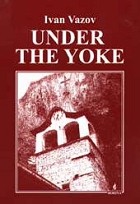Despite of being the first novel the great Bulgarian author Ivan Vazov (1850-1921) wrote, the epic "Under the yoke" is actually the crowning deed of his creative life. The novel was created in 1889-1890 influenced by epochal historical perturbations: the April Uprising of 1876 and the Liberation of Bulgaria in 1878 from the 500-year long Ottoman rule, it being an encyclopaedia of the life of Bulgarians during the last decades before the Liberation, an immortal monument of the patriotic fervour of April 1876 standing in a line with the classic achievements of the European novel, related to one of the trends of its development at that time - the creation of a novel-epopee.
In "Under the Yoke" Ivan Vazov has brought to life the entire cosmos of Bulgarian people, has formulated its philosophical and everyday-life views not clad in words by anyone before him, describing the relations between enslaved and enslavers: "Enslaved peoples have their own philosophy that reconciles them with the life as it is... A people enslaved, though without hope, never commits suicide: it eats, drinks and makes children, it makes
its time pass in merriment". Of course, this suggestion refers to "little" peoples, the "big" ones simply never fall under slavery...
Essentially, by describing the numerous merry meetings and
conversations, the feasts that various social groups organise, the ring dances, the working-bees and the folk songs Vazov has shown us that milieu in which the everyday life run and in which the sturdy, constructive optimism of the Bulgarian spirit ripened, grew luxuriantly and dominated...
Although the novel presents a specific historical moment along with a national story, "Under the Yoke" expresses in fact the pathos of the struggle for freedom that had pervaded the nation, that had transformed the temporary into eternal, the national into something common to all mankind. It is no wonder then that this novel-epopee proved to be the most popular work of Bulgarian literature abroad. Especially in countries whose historical fate was similar to Bulgarian one...

Despite of being the first novel the great Bulgarian author Ivan Vazov (1850-1921) wrote, the epic "Under the yoke" is actually the crowning deed of his creative life. The novel was created in 1889-1890 influenced by epochal historical perturbations: the April Uprising of 1876 and the Liberation of Bulgaria in 1878 from the 500-year long Ottoman rule, it being an encyclopaedia of the life of Bulgarians during the last decades before the Liberation, an immortal monument of the patriotic fervour of April 1876 standing in a line with the classic achievements of the European novel, related to one of the trends of its development at that time - the creation of a novel-epopee.
In "Under the Yoke" Ivan Vazov has brought to life the entire cosmos of Bulgarian people, has formulated its philosophical and everyday-life views not clad in words by anyone before him, describing the relations between enslaved and enslavers: "Enslaved peoples have their own philosophy that reconciles them with the life as it is... A people enslaved, though without hope, never commits suicide: it eats, drinks and makes children, it makes
its time pass in merriment". Of course, this suggestion refers to "little" peoples, the "big" ones simply never fall under slavery...
Essentially, by describing the numerous merry meetings and
conversations, the feasts that various social groups organise, the ring dances, the working-bees and the folk songs Vazov has shown us that milieu in which the everyday life run and in which the sturdy, constructive optimism of the Bulgarian spirit ripened, grew luxuriantly and dominated...
Although the novel presents a specific historical moment along with a national story, "Under the Yoke" expresses in fact the pathos of the struggle for freedom that had pervaded the nation, that had transformed the temporary into eternal, the national into something common to all mankind. It is no wonder then that this novel-epopee proved to be the most popular work of Bulgarian literature abroad. Especially in countries whose historical fate was similar to Bulgarian one...




